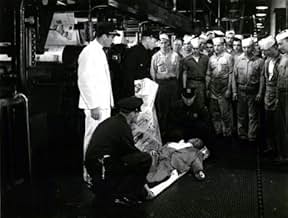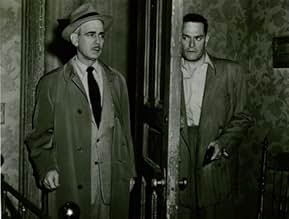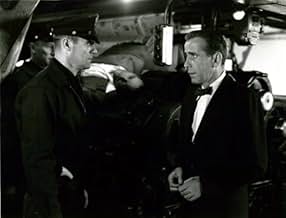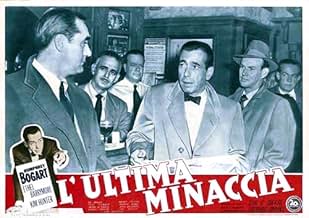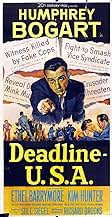IMDb RATING
7.2/10
4.6K
YOUR RATING
With his newspaper about to be sold, crusading editor Ed Hutcheson tries to complete an exposé on gangster Rienzi.With his newspaper about to be sold, crusading editor Ed Hutcheson tries to complete an exposé on gangster Rienzi.With his newspaper about to be sold, crusading editor Ed Hutcheson tries to complete an exposé on gangster Rienzi.
- Awards
- 2 wins total
Joe De Santis
- Herman Schmidt
- (as Joseph De Santis)
Parley Baer
- Headwaiter
- (uncredited)
Bill Baldwin
- Man Asking for Ed Hutcheson
- (uncredited)
Willis Bouchey
- Henry
- (uncredited)
Lovyss Bradley
- Woman
- (uncredited)
John Brooks
- Reporter
- (uncredited)
Ralph Brooks
- Newspaperman
- (uncredited)
- Director
- Writer
- All cast & crew
- Production, box office & more at IMDbPro
Featured reviews
A very good movie about The Day, a newspaper publishing its last editions, and its aggressive attack on a known mobster.
Humphrey Bogart does an excellent job as the editor, and Ethel Barrymore gives a wonderful, regal performance as the widow of the publisher, whose daughters are now demanding that the paper be sold to a competitor.
The film brings up, a mere 53 years ago, issues that are relevant today - the tabloids versus real, factual news, and the meaning of a free press. These debates continue today, but unfortunately, it seems that the tabloid type of journalism is winning.
As for a free press - our press might be freer than many, but it isn't entirely free. As anyone who lost money in the great savings and loan scandal can tell you, important stories disappear from the front pages all the time.
Bogart's strong performance is the engine that keeps this film going, and there's a nice performance by Kim Hunter as his ex-wife.
Deadline USA reminds us of the good old days, when you could believe what you read in the New York Times.
Humphrey Bogart does an excellent job as the editor, and Ethel Barrymore gives a wonderful, regal performance as the widow of the publisher, whose daughters are now demanding that the paper be sold to a competitor.
The film brings up, a mere 53 years ago, issues that are relevant today - the tabloids versus real, factual news, and the meaning of a free press. These debates continue today, but unfortunately, it seems that the tabloid type of journalism is winning.
As for a free press - our press might be freer than many, but it isn't entirely free. As anyone who lost money in the great savings and loan scandal can tell you, important stories disappear from the front pages all the time.
Bogart's strong performance is the engine that keeps this film going, and there's a nice performance by Kim Hunter as his ex-wife.
Deadline USA reminds us of the good old days, when you could believe what you read in the New York Times.
Being the editor of a newspaper is intense, when the world outside your window don't make sense, where gangsters rule the roost, the owners easily seduced, an ex-wife who will not give you recompense. So we follow you around and watch you play, it's fair to say, that these are not ordinary days, always going toe to toe, they could be friends, they could be foes, but you ensure everyone, hears what you say. The performances are fine and competent, the emotion and the passion sufficient, not really sure the story's deep, there's not a lot of underneath, but it's 90 minutes that can be well spent.
Deadline - U.S.A. has Humphrey Bogart as the editor of a big city newspaper that is in the process of being sold to a Rupert Murdoch like chain that publishes scandal sheets. His paper is in the process at the same time of doing an expose of notorious racketeer Martin Gabel.
And if that ain't enough for Bogey his wife Kim Hunter is splitting from him. It's the usual story, she can't stand having him married to her and the paper as well.
Growing up in New York in the Fifties we had several newspapers, each vying for a smaller readership. I remember we had the Times, News, Post, Herald Tribune, World-Telegram&Sun, Journal-American, and the Daily Mirror. Some of those you can see are the products of consolidation, there were more in the past. After a printer's strike in the sixties most of them went out of business.
The papers were competing for a shrinking share of readership. In the previous generation, radio competed with the print media and I grew up with that new phenomenon of television. Today we are seeing the effects of the Internet as the individual's primary source for news.
The gangster part of the plot gets started with the discovery of the body of a Virginia Hill like moll, the former mistress of Martin Gabel. While some of the scandal sheets cover the sensational aspects of the murder of a glamor girl, Bogey's paper does some serious investigative reporting and uncovers a lot of evidence. Their work also has consequences including the maiming of young reporter Warren Stevens.
In the meantime the heirs of the newspaper's original founder are looking to sell the paper. Opposing it is their mother, Ethel Barrymore and she has a fine part and is obviously the model for the widow publisher played by Nancy Marchand in Lou Grant. She has one classic scene with Humphrey Bogart where they commiserate over their mutual problems.
Deadline - U.S.A. is a realistic look at the life of a big city paper in days gone by. It's a gritty piece of nostalgia, as timely in its day as The Front Page was in the Twenties. Cast members like Paul Stewart, Jim Backus, and Ed Begley look and feel right at home at their jobs.
The film is recommended particularly for younger viewers who are glued to their computers and television to see how a newspaper functioned back in the day.
And if that ain't enough for Bogey his wife Kim Hunter is splitting from him. It's the usual story, she can't stand having him married to her and the paper as well.
Growing up in New York in the Fifties we had several newspapers, each vying for a smaller readership. I remember we had the Times, News, Post, Herald Tribune, World-Telegram&Sun, Journal-American, and the Daily Mirror. Some of those you can see are the products of consolidation, there were more in the past. After a printer's strike in the sixties most of them went out of business.
The papers were competing for a shrinking share of readership. In the previous generation, radio competed with the print media and I grew up with that new phenomenon of television. Today we are seeing the effects of the Internet as the individual's primary source for news.
The gangster part of the plot gets started with the discovery of the body of a Virginia Hill like moll, the former mistress of Martin Gabel. While some of the scandal sheets cover the sensational aspects of the murder of a glamor girl, Bogey's paper does some serious investigative reporting and uncovers a lot of evidence. Their work also has consequences including the maiming of young reporter Warren Stevens.
In the meantime the heirs of the newspaper's original founder are looking to sell the paper. Opposing it is their mother, Ethel Barrymore and she has a fine part and is obviously the model for the widow publisher played by Nancy Marchand in Lou Grant. She has one classic scene with Humphrey Bogart where they commiserate over their mutual problems.
Deadline - U.S.A. is a realistic look at the life of a big city paper in days gone by. It's a gritty piece of nostalgia, as timely in its day as The Front Page was in the Twenties. Cast members like Paul Stewart, Jim Backus, and Ed Begley look and feel right at home at their jobs.
The film is recommended particularly for younger viewers who are glued to their computers and television to see how a newspaper functioned back in the day.
The film opens with a businessman being questioned in a courtoom, similar to the House Un-American Committee This newspaper may be sold, right in the middle of the biggest news story of the year. Stars Bogart as the editor, and Ethel Barrymore as Mrs. Garrison, the owner. and Jim Backus (Mr. Howell, from Gilligan's Island) is in here. Bogart tries to convince Mrs. Garrison to keep the paper going, but its an uphill battle. Not a lot of votes on imdb for this one, so TCM must not show it very often. Touching scene, where the reporters all hold a memorial for the paper in the bar.... even more prescient today, when there are very few papers left, and those few are an endangered species. Some similarites to Citizen Kane, where the respectable paper can't compete with the yellow, sensational papers for circulation. Written and directed by Richard Brooks, who was married to Jean Simmons. Pretty good stuff. I had never seen this one before. It really strikes a nerve today, with the interwebs really killing off newspapers.
"It's not our job to prove he's guilty. We're not detectives and we're not in the crusading business." That line from Humphrey Bogart early in the film lets you know you're watching a movie about a bygone era in journalism. Or maybe that's just an idealized fantasy and reporters were never like that, because later in the film Bogart contradicts himself by instructing his reporters to "go below the belt" and "we're gonna convict him of every crime on the books." Feelings on journalistic philosophy aside, this is an exceptional crime drama about the goings-on at a newspaper that's going out of business. Before the doors are closed, editor Bogart and his reporters try to uncover the truth about a racketeer's criminal activities.
Bogart turns in one of his finest acting turns, with terrific support from Ethel Barrymore, Martin Gabel, Ed Begley, Kim Hunter, Warren Stevens, Jim Backus, and many more. The story moves along at a smooth pace and keeps your interest throughout. There's quite a bit of monologuing but the script is packed with punch and grit. It's one of the better films in writer & director Richard Brook's career. It's worth a look on its merits as a dramatic film, as well as the added historic value it has for those looking to examine the differences and similarities between how journalism was viewed yesterday versus today.
Bogart turns in one of his finest acting turns, with terrific support from Ethel Barrymore, Martin Gabel, Ed Begley, Kim Hunter, Warren Stevens, Jim Backus, and many more. The story moves along at a smooth pace and keeps your interest throughout. There's quite a bit of monologuing but the script is packed with punch and grit. It's one of the better films in writer & director Richard Brook's career. It's worth a look on its merits as a dramatic film, as well as the added historic value it has for those looking to examine the differences and similarities between how journalism was viewed yesterday versus today.
Did you know
- TriviaOriginally titled 'The Newspaper Story', location shooting took place both in the newsroom and the printing plant of The New York Daily News, with real pressmen playing themselves. This was augmented by an 'almost letter-perfect' reproduction of a newsroom on a Hollywood soundstage.
- GoofsAs Rienzi's car drives off after picking up Hutcheson, a large studio light is reflected against the side window of the car.
- Quotes
[last lines]
Ed Hutcheson: That's the press, baby. The press! And there's nothing you can do about it. Nothing!
- ConnectionsFeatured in Las Vegas, un couple (1970)
- SoundtracksJohn Brown's Body
(uncredited)
Traditional tune, lyrics attributed to various writers
Sung, with modified lyrics, by the staff in the bar and heard as a theme at other times.
- How long is Deadline - U.S.A.?Powered by Alexa
Details
Box office
- Gross worldwide
- $5,228
- Runtime1 hour 27 minutes
- Color
- Aspect ratio
- 1.37 : 1
Contribute to this page
Suggest an edit or add missing content



